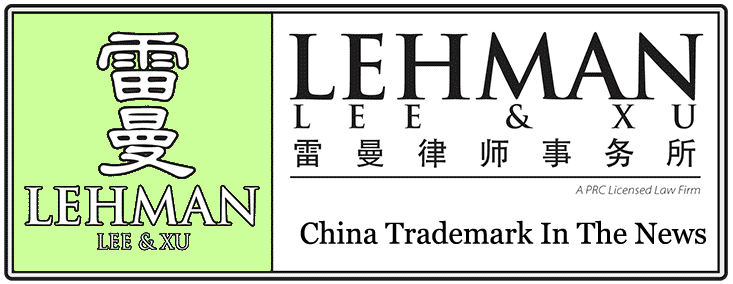

 |
LEHMAN, LEE & XU China Lawyers |
China Trademark In The News |
August 12, 2014 |
|
The China Law News keeps you on top of business, economic and political events in the China. |
In the News |
Trademark registration in China |
Last Updated: 30 July, 2014 Information provided below will guide you to:
Why Register Trademark in China? Owners of registered trademarks have the ability to prevent others (i.e., their competitors, partners in China, we had clients that found out their trademark was registered by their supplier in China and other third parties) from using their registered trademark without permission. Your registered trademark can also successfully prevent others from (A)- acquiring trademark rights in your trademark, and/or (b)- claiming that you are infringing their trademark rights. Trademark Infringement actions can be costly. Few companies have the financial strength to overcome the full or partial loss of their right to use their own business name or product name. Consequently, trademarks are critical business assets. Coca-Cola is commonly believed to be the most valuable and admired trademark worldwide. Trademarks protect your business name, product names, Domain names, logos and slogans. The decision to Trademark is likely one of the most important business decisions you will make. We would be pleased to assist you with the complex trademark registration process. It's what we do best. China's Trademark Law 1. How to protect your trademarks and service marks in China? In China you must register your trademark with the Chinese Trademark Office in order to protect your exclusive rights to that trademark in China. The Chinese trademark law system is different from the U.S. federal trademark law system. The Chinese Trademark Law provides: "Any natural person, legal entity or other organization intending to acquire the exclusive right to use a trademark, including service mark, shall file an application for the registration of the trademark with the Trademark Office". 2. What types of signs can be registered trademarks? Any visual sign, if it can be used to distinguish the goods or service of one natural person, legal entity or any other organization from that of others, including any word, design, letters of an alphabet, numerals, three-dimensional symbol, combinations of colors, and their combination, may be filed for registration. One important change is that before 2002, three-dimensional symbols or combinations of colors could not be registered trademarks in China, and now this category is readily available. Needless to say that, some special words or symbols, like countries names, international organizations names and symbols, such as the Red Cross, may not be registered as trademarks. 3. Application First Principle This principle says that where two or more applicants apply for the registration of identical or similar trademarks for the same or similar goods, the Trademark Office will approve the trademark application which is first filed. Where applications are filed on the same day, the preliminary approval shall be given to the trademark which was the earliest used, and the applications of the others shall be rejected and their trademarks shall not be published. Apparently, where the registration of a trademark which has been applied for is identical with or similar to the trademark of another person that has, in respect of the same or similar goods, been registered or, after examination, preliminarily approved, the Trademark Office shall refuse the application and shall not publish the said trademark. 4. The term for a registered trademark and trademark renewal The period of validity of a registered trademark shall be ten years, counted from the date of approval of the registration. If the registrant intends to continue to use of the registered trademark beyond the expiration of the period of validity, an application for renewal of the registration shall be made within six months before the said expiration. Where no application therefore has been filed within the said period, a grace period of six months may be allowed. If no application has been filed at the expiration the grace period, the registered trademark shall be cancelled. The period of validity of each renewal of registration shall be ten years. 5. Trademark Licensing Where any party is authorized to use a registered trademark of another person, the name of the licensee and the origin of the goods must be indicated on the goods that bear the registered trademark. The trademark license contract shall be submitted to the Trademark Office for record. 6. Trademark Infringements The following acts shall constitute an infringement: (1) To use a trademark that is identical with or similar to a registered trademark in respect of the identical or similar goods without the authorization from the trademark registrant (2) To sell goods that he knows bear a counterfeited registered trademark (3) To counterfeit, or to make, without authorization, representations of a registered trademark of another person, or to sell such representations of a registered trademark as were counterfeited, or made without authorization (4) To replace, without the consent of the trademark registrant, its or his registered trademark and market again the goods bearing the replaced trademark or (5) To cause, in other respects, prejudice to the exclusive right of another person to use a registered trademark 7. If your trademark right is infringed, what can you do? If your trademark right is infringed, first, you can resolve the dispute through consultation; if you are reluctant to resolve the matter through consultation or the consultation fails, second, you may institute legal proceedings in the People's Court or request the administrative authority for industry and commerce for actions. The Administration of Industry and Commerce (AIC) plays an extremely important role in China to assist business entities and individuals in resolving trademark disputes and infringement claims. AIC operates on national, provincial, county, and municipal levels, and is the key government agency that is responsible for corporations registration, fair competition, trademark administration, market supervision, and exercises other important functions. The AIC has the administrative authority to investigate and handle any acts of infringement of the exclusive rights to use a registered trademark according to law. 8. Criminal Penalty If any party uses, without the authorization from the trademark registrant, a trademark identical with a registered trademark, and the case is so serious as to constitute a crime, he shall be prosecuted, according to law, for his criminal liabilities in addition to his compensation for the damages suffered by the infringe. Hope all the above could help you. |
|
|
|
|
| Proud Member of |